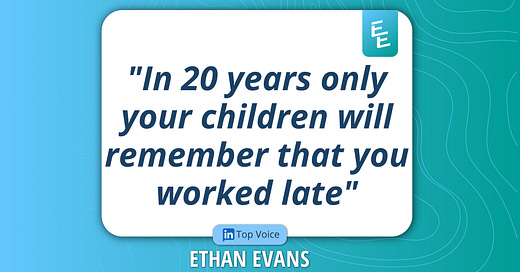"In 20 years only your children will remember that you worked late"
Do not lose sight of what you are working for in the end.
Ethan & Jason here—we hope you have a terrific week! Welcome to this week’s *free article* of Level Up: Your source for executive insights, high performance habits, and specific career growth actions. If you are not a paid subscriber, here’s what you missed this month:
"In 20 years only your children will remember that you worked late."
This quote SHOULD make you think.
Over my career, I've been a part of many close teams. Teams that worked hard together, ate lunch together every day, and attended social events together.
I've also worked long hours for every company I have served. Evening and weekends.
I am sure that most readers who follow me are the same. You heed the call of the project and the deadline, you do not let teammates down.
But, let me give you data from the far side of retirement you do not yet have.
I left Amazon over four years ago.
I have many Amazon "friends," but let me define that friendship.
Great people. Smart, hardworking, friendly, kind.
If I call, text, or email them, they are happy to hear from me.
If they call me, I am happy to hear from them.
Of these dozens of close relationships (e.g. direct reports, managers, close peers), how many of us call each other?
Almost none.
And that is just four years after departure.
I fault none of these people, nor do I think less of them. They are great people and if we have a reunion, we will enjoy catching up.
My point is, 99% of work relationships fade very shortly after either of you moves on.
If you have had a 20-year career (or close to it)—ask two questions:
How many of those people call you or you call them? If you exclude people with whom you formed a specific outside-of-work deeper relationship (e.g. hiking, squash, neighbors, whatever), I will bet for true "coworkers" (only working together) it is very, very close to zero.
If you were not direct to the CEO or SVP, has that person ever interacted with you again?
For me, #2 is no.
Not from any company, ever, has the embodiment of the "company" ever reached out.
Remember that your company cannot love you and will not love you.
Your company will never be sitting by your bedside when you are old and sick.
In the US at least, we have a culture of overwork.
Most of my posts are about how to play that game well. I make those posts though for another reason — people need (and want) money to live. Plus, it is fulfilling to do well at work.
The point of this post is to inject balance. Be friendly. Enjoy your coworkers. Climb the ladder if you want, and bank the money.
But do not lose sight of what you are working for in the end.
Do not get sucked into the idea that "the company" has loyalty back to you.
Companies are legal structures. I was a very good Amazon employee. Amazon will not be sending a fruit basket to my retirement home nor flowers to my funeral.
That isn't what companies do.
Invest in your life outside the company and never work so hard that you sacrifice things you cannot get back.
Your kids will remember not seeing you.
Look at the below time spent chart—three things stick out:
Family time sharply declines after age 20. Cherish it.
Children time peaks in your 30s and declines sharply. The “Magic Window of Childhood” is years 0-10 because you (the parent) are your child’s favorite person in the world.
Notice how coworker time goes almost to zero as soon as people retire. Our coworkers are good people but will not be with us long term.
You may respect how hard your parents worked to support you...but wouldn't you have rather had a little more of their time?
Readers, are you in balance?
"What did you fail at this week?" — a great question to ask your child (and yourself)
Sara Blakely (Founder & CEO of Spanx) shared that growing up, her father used to ask what she failed at that week and he’d celebrate it.
In fact, he’d be disappointed if she did not have something that she failed at.
This reframed her definition of success.
Failure became not trying vs the outcome.
Sara goes on to say:
“So many people don't take risks for fear of failure.
They don't start the business, they don't go create the art they want to create, or they don't go try out to be in the play, or whatever it is, for the fear of failure.
And once you redefine that for yourself, and realize the failure is just not trying, then life opens up to you in many ways.”
Data shows that 93% of the total time you will spend with your child happens between ages 0-18. You may not have unlimited time to spend with your child, but when you do, be present, and maximize it.
This post was originally shared in December 2023—we decided to update and reshare it because it serves as a good reminder as we end the year.
Connect With Ethan & Jason
Follow Ethan on LinkedIn.
Get Ethan’s career advice on YouTube.
Connect with Jason (Ethan’s operating partner) on LinkedIn.
Learn more about Ethan’s live online courses and on-demand courses.
Contact us for corporate training, speaking, podcast appearances, and more.
Many subscribers expense this newsletter to their Learning & Development budget, use this email template to send to your manager.








Can’t seem to get over that quote. Such a powerful reminder, thank you @Ethan Evans
So true and it makes s very true to me.